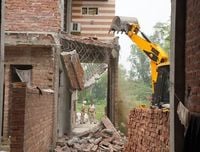In a bold move aimed at curbing the persistent menace of drug trafficking along the India-Pakistan border, police authorities on Sunday demolished the residence of Janak Singh, a suspected drug peddler, in Rangarh village. This village, nestled close to the international border, has been under scrutiny for its alleged role as a conduit for cross-border narcotics operations. The demolition marks a significant escalation in the ongoing state-wide crackdown on drug peddlers, part of the much-publicized "Yudh Nashiyan Virudh" campaign.
The action, carried out on August 17, 2025, was the latest in a series of targeted operations by the Amritsar rural police. According to The Tribune, Janak Singh’s home was razed after authorities determined it had been constructed illegally on panchayat land, using funds allegedly generated from the smuggling of narcotics. This was not a spontaneous decision: the District Development and Panchayat Officer (DDPO) had previously alerted the police to the encroachment, setting in motion the official process that culminated in Sunday’s demolition.
Maninder Singh, the Senior Superintendent of Police (Rural), provided detailed insight into the case. "Janak Singh used to work as a labourer but later entered into illegal drug trade. He was first booked in an NDPS Act case in 2022. He had constructed a palatial house on government land," said the SSP, as reported by The Tribune. The NDPS Act, short for the Narcotic Drugs and Psychotropic Substances Act, is India’s primary legislation for combating drug-related offenses.
Janak Singh’s entanglement with the law does not end with him alone. His son, Nishan Singh, and three brothers are also allegedly involved in cross-border trafficking of narcotics. Authorities have registered approximately three cases against them under the NDPS Act, painting a picture of a family deeply enmeshed in the region’s illicit trade. Notably, Janak Singh and one of his brothers are currently out on bail, while another brother remains behind bars.
The police’s decision to demolish the house was not taken lightly. According to SSP Maninder Singh, "The District Development and Panchayat Officer (DDPO) had informed the police about the illegal construction by Janak Singh after encroaching upon government land in the village and sought police help for removing it. We reached the village and demolished the house constructed here." This partnership between local development officials and law enforcement underscores a coordinated approach to the problem, blending administrative oversight with legal enforcement.
This demolition is not an isolated event. It is, in fact, the sixth such property to be razed since the "Yudh Nashiyan Virudh" campaign began. The campaign, whose name translates to "War Against Drugs," represents a comprehensive effort by Punjab’s authorities to dismantle the infrastructure supporting the region’s drug trade. The approach is multi-pronged: it targets not only the traffickers themselves but also the assets and proceeds that fuel their operations.
Since March 1, 2025, the Amritsar rural police have reported impressive results. They have confiscated approximately 150 kilograms of heroin and seized drug money amounting to Rs 2 crore. In addition, police have frozen properties belonging to drug smugglers, with a combined market value of Rs 4 crore. These numbers, reported by The Tribune, highlight the scale of the challenge and the authorities’ determination to make a dent in the criminal economy that sustains the narcotics trade.
SSP Maninder Singh emphasized that these actions are part of a broader, ongoing effort. "He said more such operations would be carried out in future after following due legal procedure," The Tribune noted. The insistence on adhering to legal norms is noteworthy, especially given the sensitivity surrounding property rights and due process. By stressing the importance of following proper procedures, the police aim to demonstrate that the crackdown is not arbitrary, but rooted in law and administrative necessity.
The demolition of Janak Singh’s residence also serves as a public warning to others involved in the drug trade. The message is clear: assets acquired through illegal means, especially those built on encroached government land, will not be tolerated. The police’s willingness to act decisively—while also maintaining legal safeguards—reflects a balancing act between deterrence and justice.
The context of this crackdown is crucial. Punjab, and particularly border districts like Amritsar, have long grappled with the scourge of narcotics. The proximity to the international border has made these areas vulnerable to cross-border smuggling, with organized networks exploiting both geography and economic vulnerability. The involvement of entire families, as in the case of Janak Singh and his relatives, points to the complexity of the challenge: drug trafficking here is not merely an individual crime, but often a deeply entrenched social problem.
Local residents have watched these developments with a mix of apprehension and hope. For some, the demolition of homes—even those built illegally—raises uncomfortable questions about displacement and the fate of families caught in the crossfire. For others, it is a necessary step to reclaim public land and send an unambiguous signal that crime does not pay. The authorities, for their part, have sought to reassure the public that only those properties proven to be linked to narcotics proceeds and constructed illegally are being targeted.
The "Yudh Nashiyan Virudh" campaign has also drawn attention to the broader issue of how best to address the roots of drug trafficking. While enforcement and asset seizures are important, many experts argue that lasting solutions require a combination of economic opportunity, rehabilitation, and community engagement. The fact that Janak Singh reportedly started as a labourer before turning to the drug trade is a reminder of the economic pressures that can drive individuals toward illicit activities.
For now, authorities remain focused on enforcement. The demolition of Janak Singh’s residence is both a symbol and a practical step in the fight against narcotics. As the campaign continues, the police have promised further operations, always "following due legal procedure"—a phrase that reflects both the seriousness of their mission and the need to maintain public trust.
With six properties demolished and millions of rupees in assets seized, the Amritsar rural police appear determined to keep up the pressure. Whether these efforts will lead to a sustained reduction in drug trafficking remains to be seen. But for the residents of Rangarh village and the wider region, Sunday’s demolition was a dramatic—and unmistakable—reminder that the war against drugs is far from over.




